| |
|
We left Düsseldorf on 11th June at 7:30 a.m.
on a sunny morning, and travelling by car via Switzerland (St. Gotthard Tunnel)
we reached Menaggio at Lake Como in Northern Italy by 5:30 p.m. Via the internet
we had made a reservation at Hotel Corona
(€55.00 for the double room, which wasn’t very modern but okay) right on
the main piazza. Parking spaces are available close by along the lakeshore
promenade. We spent a nice evening strolling through the village and along the
promenade with a beautiful view across the lake.
Breakfast in the morning was an additional €8.00
per person, but they had quite a nice buffet with fresh rolls, cheese, sliced
cold meat, muesli, etc. We didn’t expect much for breakfast in Italy anyway as
for most Italians breakfast consists of nothing more than an espresso and a dry
biscuit with jam. Therefore, after a comparatively hearty breakfast we continued
south along the western shore of the lake and reached the city of Como. We
strolled along the lakeshore promenade and through the historic city centre for
an hour.
Five ancient
villages hugging the cliffs and the sea: the Cinque Terre

Via the motorway
connecting Milan and Genoa we arrived in Monterosso al Mare around 4 p.m. Via
the internet we had booked a double room at Villa
Caribe B&B (€80.00 per night incl. breakfast and parking – the
room was small but it had a little balcony and air-condition; breakfast was
so-so. The cappuccino was good, but nothing else was fresh; everything was
offered wrapped up in plastic). We stayed in the new part of the village, called
Fegina, which extends on a long promenade adjoining the sandy beach where most
of the hotels are. Fegina’s advantages are the largest beach in Cinque Terre,
public parking and the train station. After checking in we went down the hill to
the beach where we spent the rest of the afternoon. We rented sun chairs and an
umbrella for €7.00. The water was warm and perfectly enjoyable. Later we
strolled along the sea promenade and through Monterosso’s historic centre
which can be reached via a pedestrian tunnel. We had a dinner of gnocchi and
tomato and mozzarella salad at a beach bar back in Fegina.
Monterosso is part of the Cinque Terre (the
Five Lands), 5 coastal fishing villages that hug the rocky cliffs of southern
Liguria. There are hiking trails, a narrow, winding road, and a frequently
running train service connecting all the villages. They can also be reached by
sea, except Corniglia, which is perched on top of a cliff. The trails along the
coast represent perhaps the best way to see the Cinque Terre, offering unique
views of the villages from above, of steep cliffs and the sea below. It takes
about 5 hours to walk the 12 kilometres between the 5 villages. The car should
be left at one of the public car parks in Monterosso (Fegina) or Riomaggiore.
The train tickets are very cheap and it only takes a few minutes to travel from
one town to the next. There are also special Cinque Terre cards which can be
bought at the tourist information or train station for 1 day, 3 days or 1 week’s
stay. The price includes admission to the hiking trails. We bought the 1 day
ticket for €5.40.
A beautiful hike between the mountains and the sea in Cinque Terre
The following morning we hiked all the 12 kilometres between the five
villages within only 4 hours and we did the return trip by train. With
temperatures of approx. 30 °C and some steep climbs the hike was quite
exhausting and the sweat was running freely but we were rewarded with fantastic
views over the Cinque Terre coast, the villages and the Mediterranean. We left
around 9:15 a.m. and it was already hot. First we took the path from Monterosso
to Vernazza, the pearl of the five Cinque Terre villages, which we reached after
about 1.5 hours. The hike started off with a long climb up many steps but it was
really spectacular passing along the cliff edge and through vineyards, woods and
olive terraces. Eventually we stepped around a corner to see Vernazza spread out
below.
|
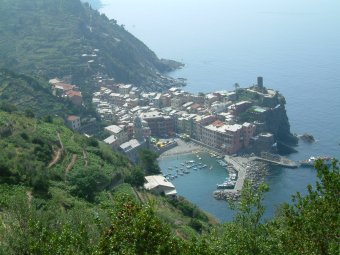 |
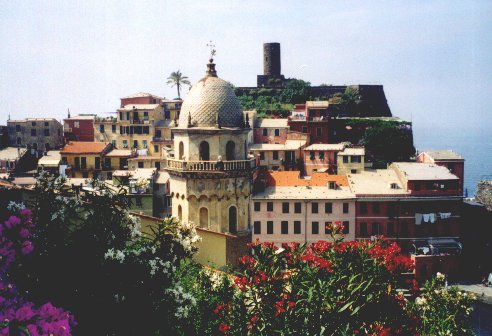
|
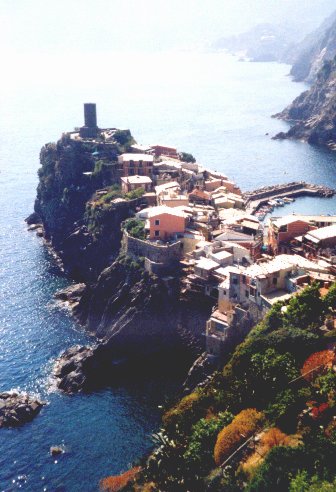
|
| From Vernazza we took the 11:30 a.m. train to the last
village, Riomaggiore,
which we reached only 10 minutes later. In Riomaggiore we took the lift (included
in the Cinque Terre Card) to the upper village. From there we strolled down to
the harbour and the rocky beach. Then we followed the "Via dell’Amore"
(the Lover’s Pathway), the most famous and easiest path of Cinque Terre,
carved directly into the rocks (only a short 15-20 minutes walk), which links
Riomaggiore to Manarola. In Manarola we discovered foccacia, thick slices of
pizza bread filled with tomatoes and basil, salami, eggplants, potatoes, etc.,
sold from little shops. Delicious! |
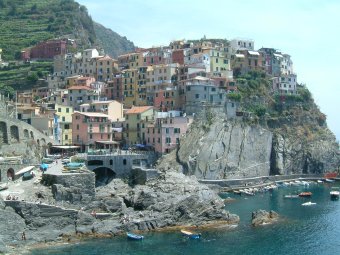 |
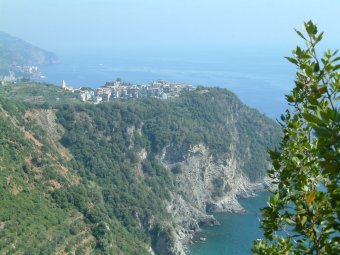 |
|
We decided to carry on to the next
village, where we arrived after approx. 45 minutes. Cornigilia was built around the year 1000 on top of a cliff and it is
connected to the sea by 365 steps. After passing by the train station we walked
up the steps leading to Corniglia and rested a while on one of the village
squares. As we didn’t feel much like retracing our steps all the way down the
stairs again and back to the train station, we decided to venture on the final
hike back to Vernazza (which we reached after 1 hour and 15 minutes, a bit less
than the official 90 minutes). It was still hot and the path was leading further
up than expected. At the last section there was a long steep descent down large
steps from high above the coastline back to sea level. We were glad that we hadn’t
taken the path from the other direction, which would definitely have been even
more exhausting! But the path was well worth the effort, offering unique views
back to Corniglia and even Manarola in the distance and down to Vernazza.
From Vernazza we took the 5:45 p.m. train back to
Monterosso. Our legs and
feet felt really tired and we had a bad muscle ache for the following three days,
even though the hike didn’t seem that strenuous at the time! There were only
two really long climbs, the one after leaving Monterosso and the one from
Corniglia. In our view the best walk was the one between Monterosso and Vernazza.
The hikes and towns were fairly crowded with tourists, but not as much as we had
feared from reading other reports on the internet. After a much needed shower we
went down to Fegina for dinner (€15 for a menu including pasta, a meat dish
with salad or chips, bread, water and wine.
From a colourful fishing village, Portovenere, to Tuscany
|
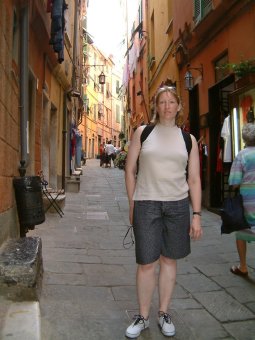 |
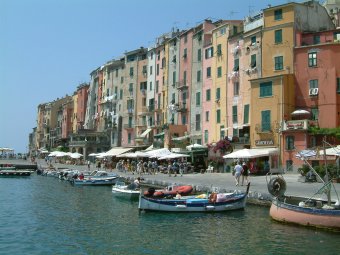
|
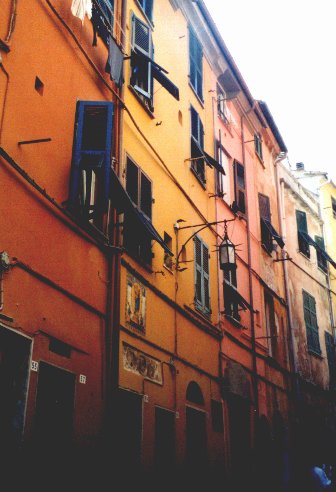
|
|
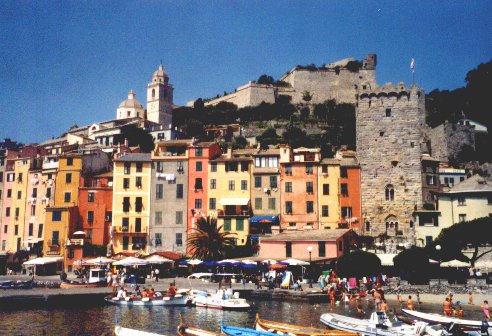
|
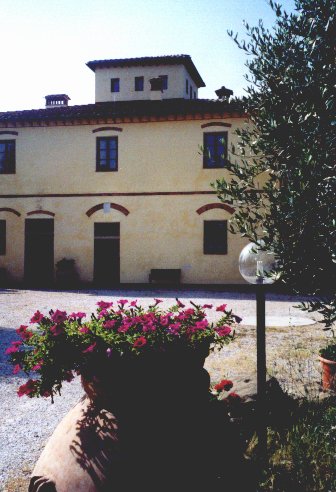 On 14th June we left Monterosso around
9:45 a.m. and, taking the
road to La Spezia, we reached Portovenere by 10:30 a.m. As it was
Saturday and on the weekends almost everyone in Italy heads for the sea, it was
nearly impossible to find a parking space. When we were about to give up we
found some space at the beach
parking, a 20 minutes walk from the town centre.
In the blazing sunlight we walked back to town, which is a very picturesque
fishing village with colourful houses, a castle and a church on a rocky
peninsula. It’s located on the Poet’s Gulf, so named for its many famous
bards, from Dante to Bryon. We strolled through the village, had a foccacia and
arrived back at the car park at 12:30 p.m. After some food shopping at a Coop
supermarket in La Spezia we were on our way to Tuscany and we arrived at our
holiday home Podere
I Moricci near Péccioli around 3:30 p.m. We had quite a large flat
(Pendolino)
on the first floor, consisting of a living-room with kitchen, bedroom and
bathroom. In total there were four flats to rent, but when we arrived we were
the only guests, quite surprising at that time of year! I Moricci is an old
villa and it is beautifully situated on top of a hill with views of the
surrounding landscape between Volterra and Pisa. There’s also a large pool and
after some unpacking we immediately tried it out! Later we cooked dinner and
walked into the nearby village of Fábbrica di Péccioli. The village has a
small supermarket and a pharmacy and an inconspicuous restaurant requiring
pre-booking. There’s only a menu at a fixed price of €20.00 per person. We
didn’t try it, but our Austrian neighbours who arrived later did. Apparently
it was quite good. On 14th June we left Monterosso around
9:45 a.m. and, taking the
road to La Spezia, we reached Portovenere by 10:30 a.m. As it was
Saturday and on the weekends almost everyone in Italy heads for the sea, it was
nearly impossible to find a parking space. When we were about to give up we
found some space at the beach
parking, a 20 minutes walk from the town centre.
In the blazing sunlight we walked back to town, which is a very picturesque
fishing village with colourful houses, a castle and a church on a rocky
peninsula. It’s located on the Poet’s Gulf, so named for its many famous
bards, from Dante to Bryon. We strolled through the village, had a foccacia and
arrived back at the car park at 12:30 p.m. After some food shopping at a Coop
supermarket in La Spezia we were on our way to Tuscany and we arrived at our
holiday home Podere
I Moricci near Péccioli around 3:30 p.m. We had quite a large flat
(Pendolino)
on the first floor, consisting of a living-room with kitchen, bedroom and
bathroom. In total there were four flats to rent, but when we arrived we were
the only guests, quite surprising at that time of year! I Moricci is an old
villa and it is beautifully situated on top of a hill with views of the
surrounding landscape between Volterra and Pisa. There’s also a large pool and
after some unpacking we immediately tried it out! Later we cooked dinner and
walked into the nearby village of Fábbrica di Péccioli. The village has a
small supermarket and a pharmacy and an inconspicuous restaurant requiring
pre-booking. There’s only a menu at a fixed price of €20.00 per person. We
didn’t try it, but our Austrian neighbours who arrived later did. Apparently
it was quite good. |
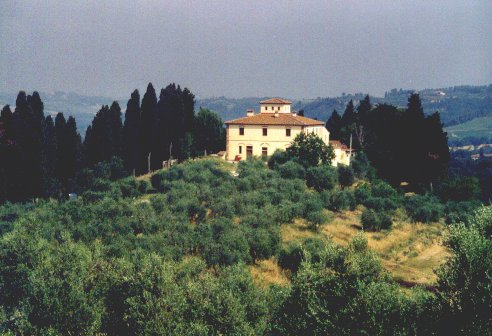 |
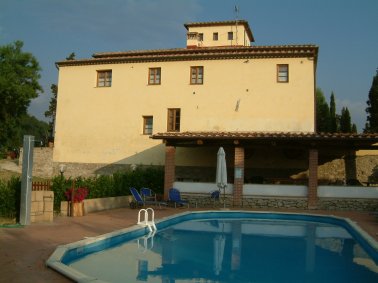 |
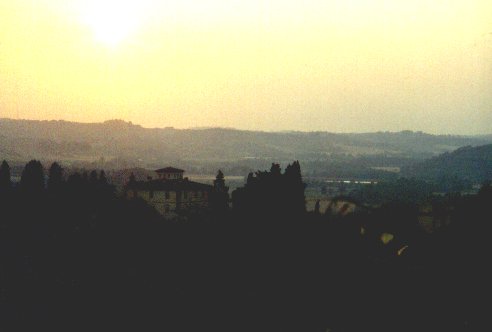 |
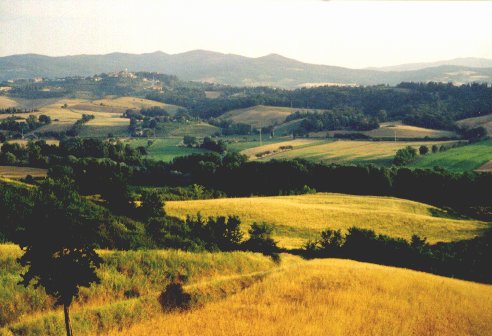 |
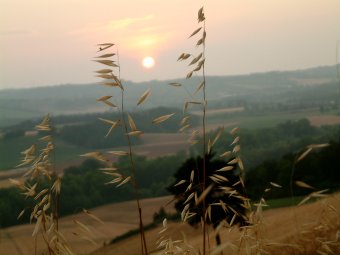 |
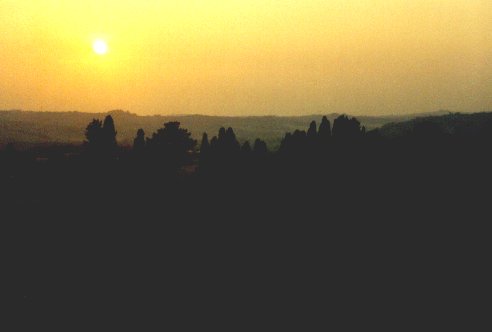 |
A "coastal" town 20 km from the sea and an old town overlooking the
new town:
Massa Marittima and Colle di Val d’Elsa
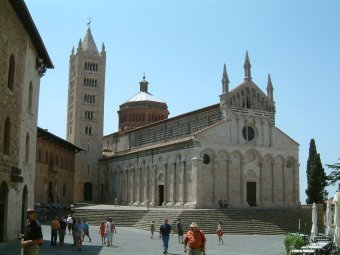 On 15th June we started off around 9:45 a.m. and after driving south On 15th June we started off around 9:45 a.m. and after driving south
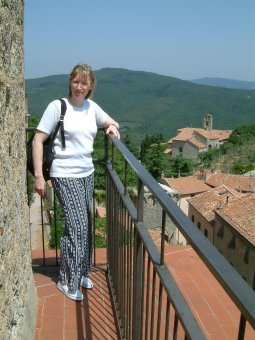 for 1.5
hours through the soft rolling hills of Tuscany we reached the town of Massa
Marittima. Despite its name Massa Marittima is located more than 20 kilometres
from the sea. Situated on the southern slopes of the "Colline Metallifere"
it is considered one of the medieval jewels of the Maremma region. The 13th
century Duomo (cathedral) San Cerbone and the Piazza Garibaldi are masterpieces
of Italian architecture. We climbed the Torre del Candeliere which offers a good
view over the town and strolled around the centre for a little while. Overall,
Massa, however, didn’t impress me as much as Siena, Lucca or San Gimingnano.
After leaving the town we drove to the ruins of the San Galgano
monastery. We
stopped for lunch at a roadside restaurant. Finally we visited the old part of
Colle di Val d’Elsa which spreads on top of a hill overlooking the new town.
The oldest part of Colle is characterized by narrow paved lanes interconnected
by many flights of steps. After a long day on the road we arrived back at I
Moricci by 5 p.m. We went for a swim and a sunbath at the pool and cooked dinner
around 7 p.m. This was to become our usual ritual for the next couple of weeks. for 1.5
hours through the soft rolling hills of Tuscany we reached the town of Massa
Marittima. Despite its name Massa Marittima is located more than 20 kilometres
from the sea. Situated on the southern slopes of the "Colline Metallifere"
it is considered one of the medieval jewels of the Maremma region. The 13th
century Duomo (cathedral) San Cerbone and the Piazza Garibaldi are masterpieces
of Italian architecture. We climbed the Torre del Candeliere which offers a good
view over the town and strolled around the centre for a little while. Overall,
Massa, however, didn’t impress me as much as Siena, Lucca or San Gimingnano.
After leaving the town we drove to the ruins of the San Galgano
monastery. We
stopped for lunch at a roadside restaurant. Finally we visited the old part of
Colle di Val d’Elsa which spreads on top of a hill overlooking the new town.
The oldest part of Colle is characterized by narrow paved lanes interconnected
by many flights of steps. After a long day on the road we arrived back at I
Moricci by 5 p.m. We went for a swim and a sunbath at the pool and cooked dinner
around 7 p.m. This was to become our usual ritual for the next couple of weeks.
|
|
From our holiday home it was about 50 km to San Gimignano, and we
arrived after about an hour’s drive just before 11 a.m. It wasn’t easy to
find a free space on one of the parking lots outside of the city walls and cars
were already queuing up, so we were about to give up and return another time.
But the last one we tried still had some space left, so we were lucky. We were
charged €2 per hour. To avoid the busiest time of the day the recommendation
is to come either early in the morning, or late in the afternoon. San Gimignano
is not a large town and as Italy’s "Medieval Manhattan" it’s
included in almost all tours of Tuscany, so it’s no surprise that it’s full
of tourists. Of San Gimignano’s 72 medieval towers, only 14 remain. But that’s
still many more than all other towns can boast of! We walked around the historic
centre for a couple of hours and climbed the 54 m high Torre Grossa, the highest
tower in town, which offers a great view over the city and its surrounding area.
We couldn’t find any foccacia like in Cinque Terre, but we had a pizza slice
for lunch. We arrived back at I Moricci around 2 p.m. and went for a swim in the
pool. An hour later clouds appeared and the blue sky turned dark. There were
strong winds coming up and we saw a thunderstorm in the distance. Around 6 p.m.
we went to the Coop supermarket at the road to Péccioli to do some shopping for
our dinner. Later that evening we walked to nearby Fábbrica di Péccioli to
make a phone call home.
|
|
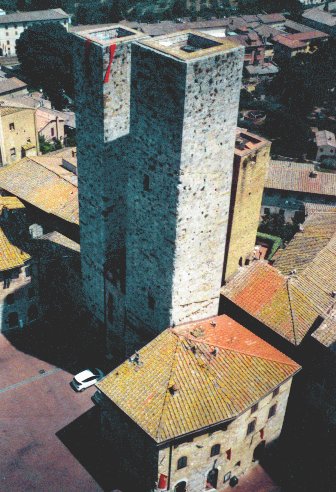
|
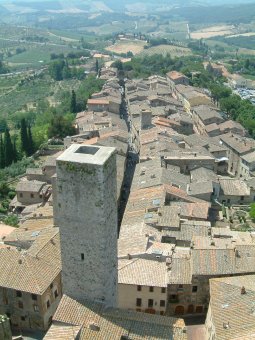
|
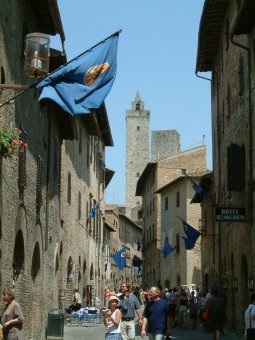
|
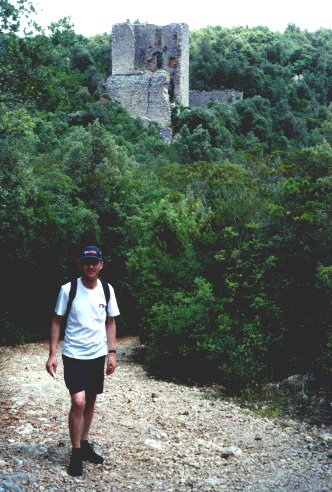
A hike in the heat
In spite of another day promising temperatures of 30-35 °C we left for
Montecatini around 10 a.m. this morning, following the description of a hike in
a nature reserve in that area. But unfortunately we couldn’t find the starting
point, no matter how hard we tried. Eventually we turned around and stopped off
near Volterra for a quick lunch of bruschetta (toasted bread with tomatoes),
lasagne and tartuffo ice-cream. Thus fortified we started off on another hike
near the village of Pignano. We left the car at the roadside and hiked to the
Fattoria di Castelvecchio and the castle ruins of Castelvecchio following a path
through vineyards and woods. We saw a deer and a couple of hares. All in all it
took us about 2.5 hours. It was very hot but at least there were a few clouds
offering a bit of shadow. When we arrived back at I Moricci around 4 p.m. we
immediately went for a swim and lazed about at the pool for the rest of the
evening.
|
Florence: The Medici City
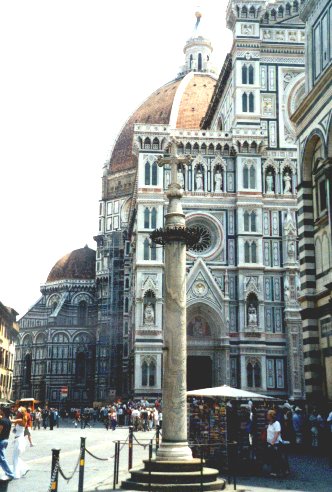 After a night of
lightning, thunder and rain we decided to visit Florence,
expecting the heat in t he Florentine valley to have cooled down a bit. We went
to the town of Pontedera After a night of
lightning, thunder and rain we decided to visit Florence,
expecting the heat in t he Florentine valley to have cooled down a bit. We went
to the town of Pontedera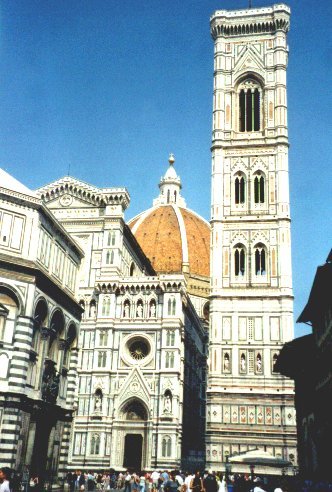 by car (a 20 minutes drive) and from there we took the
train (€8.00 per person for a return ticket)
in order to avoid the heavy
traffic and parking problems in Florence. The trip took an hour and we arrived
in Florence by 12 p.m. Temperatures were still quite agreeable. As Florence lies
in a valley it is said to be very hot, humid and smoggy in
summer. We walked
around the city centre and visited its sights: the 13th-century cathedral Santa
Maria del Fiore, the churches Santa Maria Novella, San Lorenzo and Santa Croce,
Piazza della Signoria, Ponte Vecchio, Belvedere Fortress. Florence’s economic
and cultural predominance goes back to the Medici in the 15th and 16th centuries.
We didn’t visit the Uffizi Art Gallery which requires advance booking or a
long time of queuing, and as it’s so large you could spend more than a day
there. Copies of Michelangelo’s famous David statue can be found in front of
the Palazzo Vecchio and on Piazzale Michelangelo. The latter offers beautiful
views over the city and it’s only a 15 minutes or so walk across the Arno
River and up a hill. The churches all charged entry fees, except the cathedral.
When we arrived there was a long queue, so we came back in the afternoon.
Climbing the cathedral dome or its campanile was €6.00. We took the 4 p.m.
train back to Pontedera and returned to our holiday home for our daily swim.
Admired and photographed the sunset. New guests arrived, a couple from Munich,
Jan and Astrid, with their little daughter. When they went to Florence by car a
few days later they paid €21.00 parking fee (€3.50 per hour)! by car (a 20 minutes drive) and from there we took the
train (€8.00 per person for a return ticket)
in order to avoid the heavy
traffic and parking problems in Florence. The trip took an hour and we arrived
in Florence by 12 p.m. Temperatures were still quite agreeable. As Florence lies
in a valley it is said to be very hot, humid and smoggy in
summer. We walked
around the city centre and visited its sights: the 13th-century cathedral Santa
Maria del Fiore, the churches Santa Maria Novella, San Lorenzo and Santa Croce,
Piazza della Signoria, Ponte Vecchio, Belvedere Fortress. Florence’s economic
and cultural predominance goes back to the Medici in the 15th and 16th centuries.
We didn’t visit the Uffizi Art Gallery which requires advance booking or a
long time of queuing, and as it’s so large you could spend more than a day
there. Copies of Michelangelo’s famous David statue can be found in front of
the Palazzo Vecchio and on Piazzale Michelangelo. The latter offers beautiful
views over the city and it’s only a 15 minutes or so walk across the Arno
River and up a hill. The churches all charged entry fees, except the cathedral.
When we arrived there was a long queue, so we came back in the afternoon.
Climbing the cathedral dome or its campanile was €6.00. We took the 4 p.m.
train back to Pontedera and returned to our holiday home for our daily swim.
Admired and photographed the sunset. New guests arrived, a couple from Munich,
Jan and Astrid, with their little daughter. When they went to Florence by car a
few days later they paid €21.00 parking fee (€3.50 per hour)!
|
|
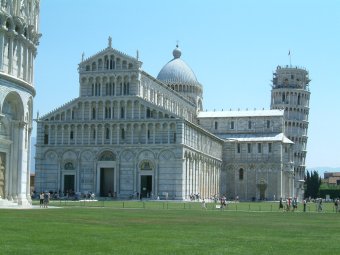
|
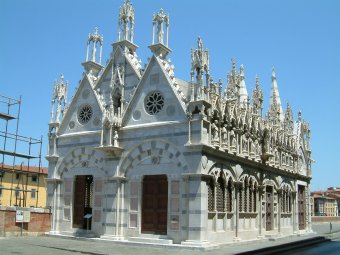
|
|
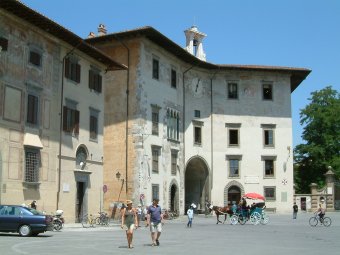
|
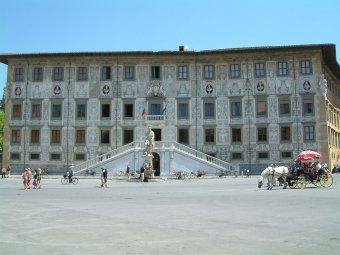
|
A tower overlooking the
Arno valley and the birthplace of a genius: San Miniato and Vinci
|
|
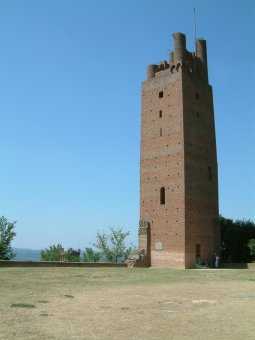 |
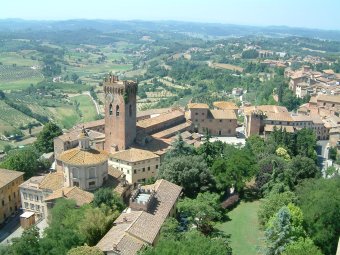 |
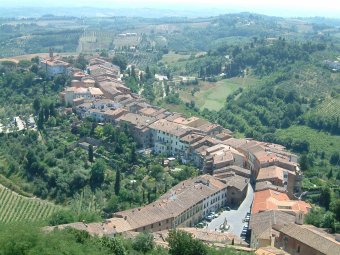 |
| This morning we left around 10.45 a.m. and drove cross-country to Vinci,
Leonardo da Vinci's hometown, situated a few kilometres from Florence and
Pistoia. We stopped off at San Miniato on the way and climbed its tower Torre di
Frederico II, which offers a fantastic view over the Arno valley. In Vinci we
visited the Museo Leonardino with models constructed after Leonardo da Vinci's
drawings. Leonardo was a man well beyond his time. He was a renaissance
painter, architect, engineer, mathematician and philosopher, a true genius. For its €5.00
entry fee the museum was interesting, but much smaller than expected. We went
for a pasta lunch at a roadside restaurant and had a quick look at the Villa
Medicea di Poggi a Caiano. Then we returned via the Fi-Pi-Li motorway and
arrived back at I Moricci by 5 p.m. More guests had arrived, 2 couples from
Austria. At around 10 p.m. we heard some music coming from Fábbrica di
Péccioli and we went to have a look. There was a little country festival with
live music going on. I have never seen so many fireflies as that night on the
way to the village! They were sparkling in the dark like Christmas illumination!
When we returned after a little while, we joined Jan and Astrid for a glass of
wine on the terrace. |
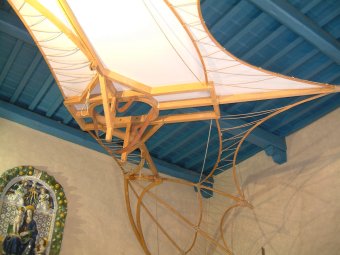 |
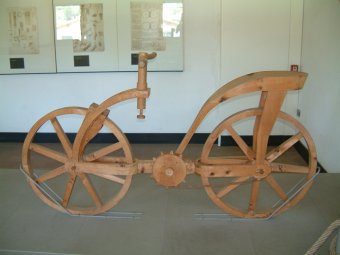 |
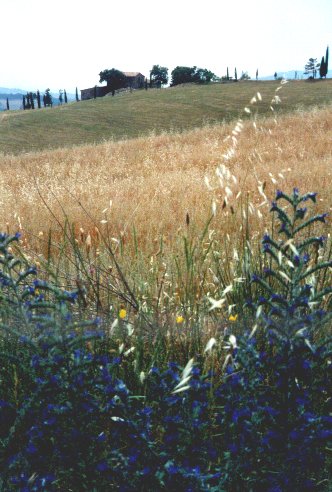
A tour in the countryside
On 22nd June we slept till late and after breakfast we went to the
pool. Everyone else was there, too! After lunch we left around 2 p.m. for a
drive around the Tuscan countryside, stopping off at the village of Lari with
its castle. Then we went for a 1.5 hours hike near Casciana Terme. It was hot
but a bit windy. We walked past orchards, olive groves and through the forest
and arrived back at I Moricci around 6 p.m. After taking a shower we went out
for dinner. We had a lovely meal at the Trattoria La Botteghina near Chianni
consisting of pasta with wild boar minced meat sauce for starters, rabbit and
duck for the main course, and ice-cream for dessert, plus bread, wine and water,
all for a total of €33.00. It was very good and comparatively cheap! |
A walled city and a bareback horse race:
Monteriggioni and Siena
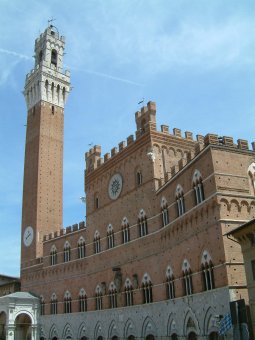 We left around 11 a.m. and 1 hour later we reached Monteriggioni with its
nearly intact 13th century fortified wall, covering a length of 570
meters and alternated by 14 towers and 2 gates. We strolled through the village
and arrived in Siena by 1 p.m. We left around 11 a.m. and 1 hour later we reached Monteriggioni with its
nearly intact 13th century fortified wall, covering a length of 570
meters and alternated by 14 towers and 2 gates. We strolled through the village
and arrived in Siena by 1 p.m.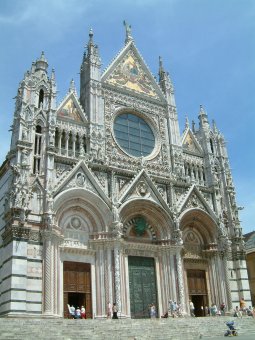 We went to see the cathedral, which has a very
impressive façade and interior, and the beautiful Piazza del Campo with the
Palazzo Pubblico. Here the Palio, a wild bareback horse race instituted in
1147, is celebrated every year in July and August. We climbed the 400 steps of
the 102 m high Torre del Mangia built in the 14th century. The views from here
over the rooftops of medieval Siena and the outlying Tuscany hills are
breathtaking. Only a certain number of visitors are allowed to climb the tower
at a time so that tickets (€5.50) can be purchased only for a certain time of
day and waiting periods should be expected! It is therefore recommended to buy a
ticket for the tower immediately upon arrival in Siena. You can then visit the
town until the time indicated on the ticket for access to the tower. We were
lucky in so far that we arrived at the Torre del Mangia shortly before the
afternoon ticket sale was opened at 3 p.m. We queued for 20 minutes and were
able to get tickets for 3:15 p.m. In the remaining waiting time we bought an
ice-cream at an ice-cream parlour with a view of the piazza from a balcony on
the first floor! We left Siena at 4:15 p.m. and arrived back at I Moricci 1.5
hours later. Jumped into the pool and had dinner. We went to see the cathedral, which has a very
impressive façade and interior, and the beautiful Piazza del Campo with the
Palazzo Pubblico. Here the Palio, a wild bareback horse race instituted in
1147, is celebrated every year in July and August. We climbed the 400 steps of
the 102 m high Torre del Mangia built in the 14th century. The views from here
over the rooftops of medieval Siena and the outlying Tuscany hills are
breathtaking. Only a certain number of visitors are allowed to climb the tower
at a time so that tickets (€5.50) can be purchased only for a certain time of
day and waiting periods should be expected! It is therefore recommended to buy a
ticket for the tower immediately upon arrival in Siena. You can then visit the
town until the time indicated on the ticket for access to the tower. We were
lucky in so far that we arrived at the Torre del Mangia shortly before the
afternoon ticket sale was opened at 3 p.m. We queued for 20 minutes and were
able to get tickets for 3:15 p.m. In the remaining waiting time we bought an
ice-cream at an ice-cream parlour with a view of the piazza from a balcony on
the first floor! We left Siena at 4:15 p.m. and arrived back at I Moricci 1.5
hours later. Jumped into the pool and had dinner.
|
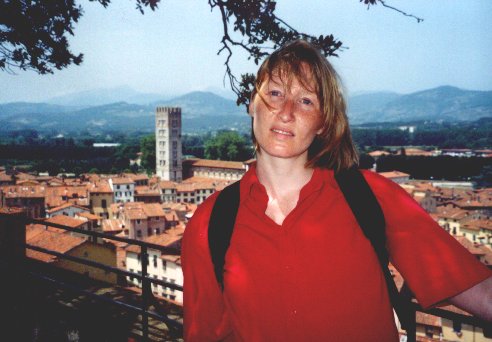 |
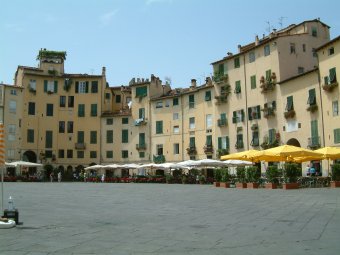 |
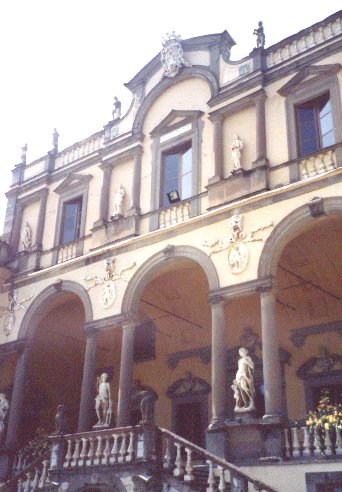 We left for Lucca at 10:30 a.m. and arrived around
noon. We parked outside of
the city walls and walked through the historic centre: Piazza del Mercato built
in the shape of the former Roman
amphitheatre, the church of San Michele in Foro
with its beautiful façade, the Duomo San Martino, Torre delle Ore, etc. We left for Lucca at 10:30 a.m. and arrived around
noon. We parked outside of
the city walls and walked through the historic centre: Piazza del Mercato built
in the shape of the former Roman
amphitheatre, the church of San Michele in Foro
with its beautiful façade, the Duomo San Martino, Torre delle Ore, etc.
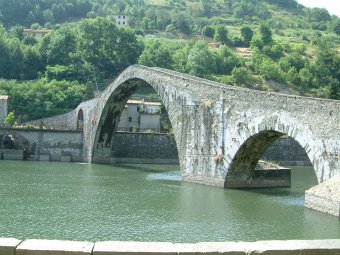 Had a
piazza lunch (€13.00 incl. water) on Piazza Napoleone. Climbed the 230 steps
up Torre Guinigi (€4.00) with a beautiful view over the town and a tree on top!
Lucca is a very charming town with lots of nice restaurants where you can sit
outside without being disturbed by
cars. The bicycle is the preferred mode of transportation within the city walls. We returned to our car via the Passegiata
della Mura. Lucca's 16th-century fortification wall is topped by a tree-lined
promenade running a 4.2 km loop around the city rooftops. We left the town
around 3 p.m. and went to the Devil’s Bridge, Ponte del Diavolo, in Borgo a
Mozzano and to Villa Mansi in Segromigno in Monte. Arrived back at our holiday
villa around 5:30 p.m. Had a
piazza lunch (€13.00 incl. water) on Piazza Napoleone. Climbed the 230 steps
up Torre Guinigi (€4.00) with a beautiful view over the town and a tree on top!
Lucca is a very charming town with lots of nice restaurants where you can sit
outside without being disturbed by
cars. The bicycle is the preferred mode of transportation within the city walls. We returned to our car via the Passegiata
della Mura. Lucca's 16th-century fortification wall is topped by a tree-lined
promenade running a 4.2 km loop around the city rooftops. We left the town
around 3 p.m. and went to the Devil’s Bridge, Ponte del Diavolo, in Borgo a
Mozzano and to Villa Mansi in Segromigno in Monte. Arrived back at our holiday
villa around 5:30 p.m. |
Another lazy day
On our last day at I Moricci we just lazed about at the
pool. In the evening
we went to the Trattoria La Botteghina again (€32.00 for 2 penne cinghiale, 1
rabbit, 1 dish of goat meat, 1 portion of beans as a side dish, 1 mixed salad,
½ litre of red wine, 1 litre of water). It was also Jan and Astrid’s last day
and upon our return we joined them once again on the terrace.
A day spent with friends in Reggio Emilia and at Ferrari in Módena
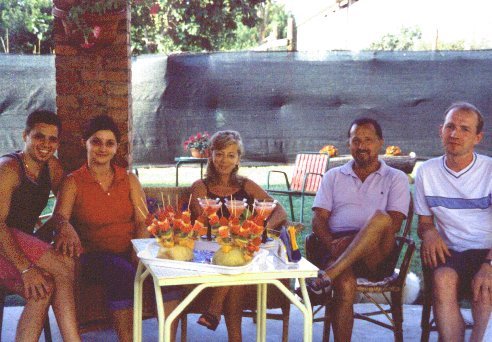 On
Saturday, 28th June, we left I Moricci around 10 a.m. and
arrived in Reggio Emilia at 12:30 p.m. where we were met at the motorway exit by
Mimmo and Caterina who are old friends of the family. When I was 17/18 years old
I went on school trips to the Amalfi coast near Naples a couple of times and
they were my host family. Later they came to see my family in Schwerte and On
Saturday, 28th June, we left I Moricci around 10 a.m. and
arrived in Reggio Emilia at 12:30 p.m. where we were met at the motorway exit by
Mimmo and Caterina who are old friends of the family. When I was 17/18 years old
I went on school trips to the Amalfi coast near Naples a couple of times and
they were my host family. Later they came to see my family in Schwerte and we
went to see them in Italy again later on. But the last time we met was 10 years
ago. They have now bought an old farm house near Reggio Emilia which they are
about to do up with the help of their sons. They gave us a hearty welcome and we
had a "light" lunch of pizza, salami, parmesan cheese, tomato and
mozzarella salad, pizza spaghetti and melon followed by coffee. As Mimmo now
works for Ferrari, we went to the Galleria Ferrari near Módena (Maranello) in
the afternoon. It was a cloudy day (the first one during our holiday) and on the
way there we were suddenly hit by a heavy rain storm and even hail! But luckily
it didn’t last very long. After visiting the gallery we returned to their
house and we had some wonderful fruit sticks and a drink. In the early evening
Mimmo took us to Reggio Emilia for a walk through the city centre. Dinner at
9:30 p.m. consisted of spaghetti with mussels, melanzana (eggplant pudding),
grilled meat and a cake of fruit and cream for dessert. It was lovely but we
overate! we
went to see them in Italy again later on. But the last time we met was 10 years
ago. They have now bought an old farm house near Reggio Emilia which they are
about to do up with the help of their sons. They gave us a hearty welcome and we
had a "light" lunch of pizza, salami, parmesan cheese, tomato and
mozzarella salad, pizza spaghetti and melon followed by coffee. As Mimmo now
works for Ferrari, we went to the Galleria Ferrari near Módena (Maranello) in
the afternoon. It was a cloudy day (the first one during our holiday) and on the
way there we were suddenly hit by a heavy rain storm and even hail! But luckily
it didn’t last very long. After visiting the gallery we returned to their
house and we had some wonderful fruit sticks and a drink. In the early evening
Mimmo took us to Reggio Emilia for a walk through the city centre. Dinner at
9:30 p.m. consisted of spaghetti with mussels, melanzana (eggplant pudding),
grilled meat and a cake of fruit and cream for dessert. It was lovely but we
overate!
A waterfall in Switzerland: The Rheinfall
After breakfast (croissants, biscuits and jam,
coffee) on Sunday it was time
to say goodbye. We left at 10:30 a.m. and via Milano we reached Switzerland. On
our return trip we travelled through the San Bernadino Tunnel. We were planning
to spend another night near Lake Constance at the border to Germany but after
visiting the Rheinfall waterfall (only €0.75 for the ticket to the viewing
platforms, but more than €4.00 for a grilled sausage!) near Schaffhausen,
which we reached at 5:30 p.m., we decided to continue straight back home. It was
another 4 hours drive (with a stop at MacDonalds in Germany) and we arrived back
in Düsseldorf by 11:30 p.m.
Final comments
|
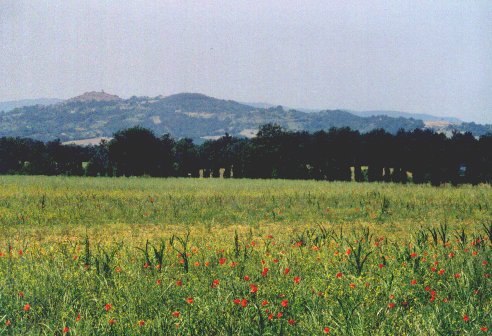 |
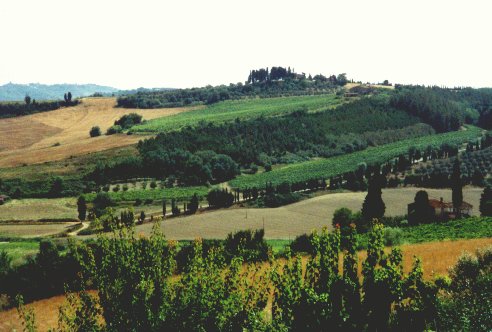 |
|
We spet a lovely time in
Italy with sunshine every day. It was unusually hot, 30-35 °C, for June – the
maximum temperature normally being only 28 °C – but luckily we had the pool
to cool down after visiting the different sights! We had booked the upstairs
flat as it offered some more privacy but later we regretted that we didn’t
have immediate access to the terrace and garden like the downstairs flats. With
the hot summer weather we had, it was very agreeable to sit and eat outside.
Unfortunately in all of Tuscany we didn’t
come across any more foccacia, which we enjoyed so much as a lunch snack in
Cinque Terre. Instead we often had pizza slices. But ordering a full size pizza
in a restaurant for lunch proved to be very difficult. Most restaurants (even if
they call themselves "pizzeria") offer pizza only in the evening!
We enjoyed Siena, Lucca and Volterra because
they were not so much overrun by tourists like San Gimignano or Pisa. In Pisa,
however, this can only be said of the Piazza dei Miracoli. Nevertheless San
Gimignano was worth the visit as it’s very special with its towers. The Cinque
Terre and Portovenere were pretty crowded with tourists and expensive, but
lovely.
And there are still many more places to see in Tuscany…
|
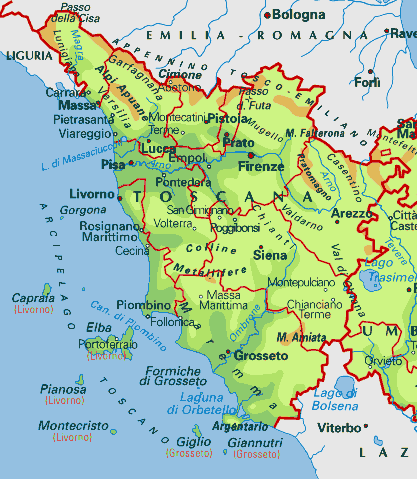
|
|

